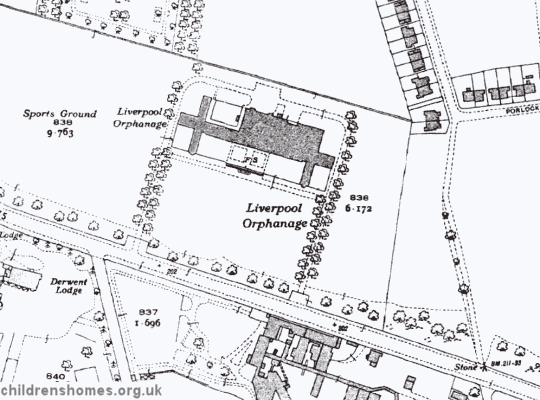Liverpool Orphanage, Liverpool, Lancashire
The Liverpool Orphanage grew out of three separate establishments: the Female Orphan Asylum, the Orphan Boys' Asylum, and the Infant Orphan Asylum, which had occupied adjacent premises at Myrtle Street, Liverpool. The management of the three institutions was merged in 1913 to form the Liverpool Orphan Asylum which was renamed in 1925 to become the Liverpool Orphanage.
In the late 1920s, the Orphanage had decided to move out of the city centre and new premises were built on Woolton Road, in the Childwall district of Liverpool, opening in the summer of 1934. The Woolton Road site is shown on the 1937 map below.

Liverpool Orphanage site, Childwall, c.1937.
In 1940, to escape the danger of wartime raids, the inmates were evacuated to the Lake District. The girls went to Wanlass Howe, a large house at Waterhead, near Ambleside, while the boys were despatched to a property known as Hawse End, near Keswick. The Woolton Road premises continued to be requisitioned after the war and the children were not able to return until 1952.
The following year, a new building at the rear of the Orphanage was opened as the Childwall Church of England School. In 1958, the Orphanage was renamed Salisbury House. From 1962, Salisbury House was used to provide boarding facilities for the School.
The establishment closed in the early 1970s and modern housing now occupies the site.
Records
Note: many repositories impose a closure period of up to 100 years for records identifying individuals. Before travelling a long distance, always check that the records you want to consult will be available.
- Liverpool Record Office and Local History Service, Central Library, William Brown Street, Liverpool L3 8EW. Holdings for Liverpool Orphanage / Salisbury House era include: Annual reports (1914-1971); Case files (1964-74); Staff books (1957-74); Accounts (1914-64); Minutes (1914-1970); Correspondence (1914-73); Attendance registers (1932-65).
Bibliography
- Higginbotham, Peter Children's Homes: A History of Institutional Care for Britain s Young (2017, Pen & Sword)
Links
- None identified at present.
Except where indicated, this page () © Peter Higginbotham. Contents may not be reproduced without permission.


